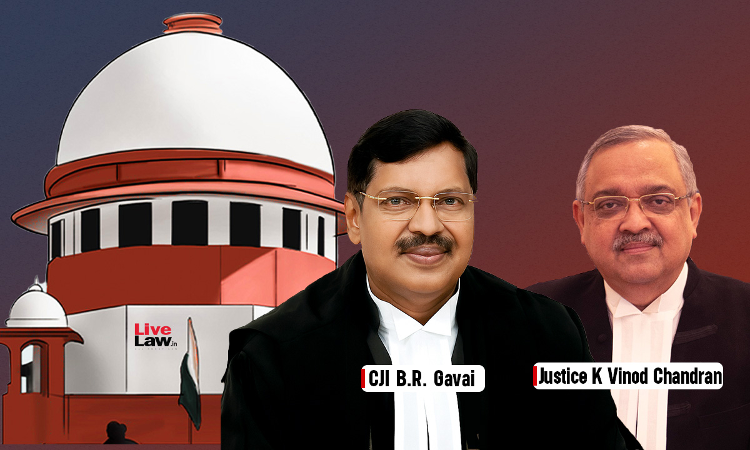- Home
- /
- Top Stories
- /
- Experience As Judicial Officer ...
Experience As Judicial Officer Can't Be Counted Towards '3-Year Practice' For Civil Judge Exams : Supreme Court
Anmol Kaur Bawa
14 Aug 2025 4:11 PM IST
The Supreme Court today (August 14) refused to entertain an application seeking to modify its earlier order on the 3-year practice rule to state that a judicial officer's experience be treated equivalent to a practising lawyer. The Court said that it will lead to opening Pandora's box. The bench of CJI BR Gavai and Justice K Vinod Chandran was hearing an application filed in the recent...
The Supreme Court today (August 14) refused to entertain an application seeking to modify its earlier order on the 3-year practice rule to state that a judicial officer's experience be treated equivalent to a practising lawyer. The Court said that it will lead to opening Pandora's box.
The bench of CJI BR Gavai and Justice K Vinod Chandran was hearing an application filed in the recent decision, which mandates a minimum practice of three years as an advocate for a candidate to apply for entry-level posts in the judicial service.
The Counsel sought a clarification of the judgment to the extent that prior experience as a judicial officer be considered as equivalent to a practising lawyer.
He explained, "I am a judicial officer serving in Gwalior, MP. As per the earlier law, I got qualified and am serving from 2019 to now. As your lordships may know, we are entitled to write exams across the country - my experience as a judicial officer may be considered equal to the practice of lawyers".
The counsel referred to the observation by the Court in the order, where it clarified that as law clerks of Judges will be counted towards the said 3-year practice.
Making an analogy on the similar footing as the Law Clerks, the counsel stressed, "because Law Clerks also worked under judicial officers - their experience is counted as a qualification to sit for the exam - I may be losing out, that's the small clarification required."
The CJI, disinclined to entertain the matter, said, "No, you appear for the MP Judicial exams."
The Counsel pressed that it was crucial to understand that judicial experience was 'richer' than advocacy. He said, "There is a general perception that one time writing is equal to 10 times reading. My lords, judicial experience is much richer."
Refusing to interfere in the decision, the CJI said, "It will open a Pandora's box"
What Is The 3-Year Practice Rule?
"All High Courts and State Governments shall amend the service rules to the effect that candidates desirous of appearing in Civil Judge (Junior Division) must have a practice of a minimum period of 3 years to be eligible for said examination," the Court ordered in the judgment in the All India Judges Association case in May this year.
"The said requirement of minimum years of practice shall not be applicable where the concerned High Court has already initiated the selection process for the post of civil judge and shall be applicable for next recruitment process," the Court added.
To fulfil the said requirement, the candidate must possess a certificate duly certified either by the Principal Judicial officer of that court, or an advocate of that court having minimum standing of 10 years duly endorsed by the Principal Judicial officer of that district or a Principal Judicial Officer of such station.
In case of a person practising at the Supreme Court or the High Court, a certificate by an advocate having a minimum standing of ten years, endorsed by an officer designated by the Court, will act as proof.
In the judgment, the Court said that allowing fresh law graduates to enter judicial service without even a single day of practice has led to problems.
A bench comprising Chief Justice of India BR Gavai, Justice AG Masih and Justice K Vinod Chandran pronounced the verdict in the All India Judges Association case. The judgment also issued directions regarding the promotion quota for Limited Departmental Competitive Exam.
Initially, there was a condition in most States that only lawyers with a minimum practice of three years could apply for judicial service.
In 2002, the Supreme Court had done away with the minimum practice requirement, allowing fresh law graduates to apply for Munsiff-Magistrate posts. However, applications were later filed in the Supreme Court seeking the reinstatement of the condition that only lawyers. Several High Courts also backed the move to reinstate the minimum practice requirement.
The Court had reserved judgment on the applications on January 28, 2025. After the judgment was reserved, the Court stayed the recruitment process which was initiated by the Gujarat High Court without the minimum service condition.
Case Details : MA in ALL INDIA JUDGES ASSOCIATION AND ORS. Versus UNION OF INDIA AND ORS|W.P.(C) No. 1022/1989
Click Here To Read/Download Order



